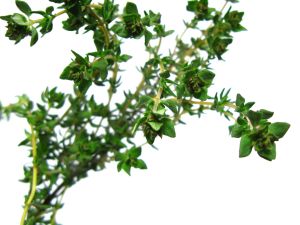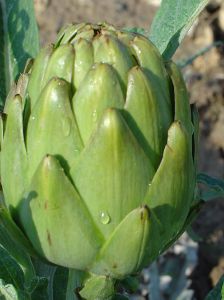, botanically known as
Thymus vulgaris
, is a perennial garden herb that has been employed since ancient times for medicinal and culinary uses.
The World's Healthiest Foods
notes that thyme has traditionally been associated with courage, with medieval women giving sprigs of thyme to knights going into battle; it has also been used as an herbal remedy for a host of ailments (PMS, Indigestion, Coughs..). It is an excellent source of iron and manganese, a very good source of calcium and a food source of dietary fiber.Since the 16th century, thyme oil has been used for its antiseptic properties, both as mouthwash and a topical application. Thyme tea, rich in volatile oils, minerals, beneficial phenols and flavonoids, is a healthy beverage choice. One of the popular culinary herb plants, thyme is native to Southern Europe and Mediterranean regions.
For thousands of years, herbs and spices have been used to help preserve foods and protect them from microbial contamination. Research shows that both thyme and basil contain constituents that can both prevent contamination and decontaminate previously contaminated foods.
Thymol has been found to protect and significantly increase the percentage of healthy fats found in cell membranes and other cell structures. In particular, the amount of DHA (an omega-3 fatty acid) in brain, kidney, and heart cell membranes was increased after dietary supplementation with thyme.
In Lebanon we use green and dried thyme extensively. Dried thyme mixed with sumac, toasted sesame seeds and salt is called Zaatar.
It is the main ingredient in the most traditional breakfast food, namely the Man'oushi...or Zaatar pie, which is sold in every bakery and many street vendor carts.
Mom was certain to serve us Zaatar on mornings when we had exams at school. She said it helped with memory. Although she wouldn't have known science was behind her belief, she was right!
(photo courtesy of Stephen Masry)
Culinary Tips
Green wild thyme makes a very healthy salad! Serve it with grilled meats and fish, or accompanied by Feta cheese and tomatoes for breakfast. I like to use it in place of Oregano in some pasta dishes. Dry Zaatar is delicious sprinkled on yogurt, hummus and plain omelets.
You can find Zaatar at most Middle Eastern markets. Make sure you choose Jordanian or Lebanese Zaatar. There are some inferior products out there that taste like dirt!
Amending Store Bought Zaatar
For each cup of store bought Zaatar (Middle Eastern Thyme mix) you will need:
1 Tbs. dried Sumac (available at Middle Eastern markets in packets or jars) 1/2 tsp. of salt
2 tsp. toasted Sesame Seeds (even if there are some in the mix)
Mix all together and store in airtight jars in the refrigerator for 6 months, or freeze for up to 2 years.
Green Wild Thyme Salad
1 bunch of green Wild Thyme, rinsed and leaves picked off stems
1 very small Onion (yellow or white), finely chopped
1/3 c. finely chopped organic Green Onion
Juice from 1 freshly squeezed Lemon
1 Tbs. extra virgin Olive Oil
1/4 tsp. Sea Salt (opt.)
Mix all together in non-metal bowl. Serve at room temperature for best flavor.
~ Sahtein! (double health) ♥



